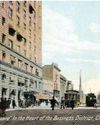After four years of tests and screenings and near-death experiences, a Syrian family was approved to move to the United States. But they were stranded at the airport in January while a network of refugees in Charlotte anxiously awaited their arrival

OSAMA SPENT NEARLY FOUR YEARS bringing his family this close to safety. He led them out of war in Syria and into Jordan as refugees. They endured violence, sickness, and financial hardship. What should’ve been the easiest part—the flight to Charlotte from Jordan—endangered the entire journey.
At first, confusion was the problem. On January 19, a miscommunication between Osama and the U.N. Refugee Agency office caused the family to miss their flight.
The next time, it was weather. On January 20—the day Americans inaugurated Donald Trump as president in Washington—Osama’s family sat on a plane that couldn’t leave the tarmac in Amman. Fog rolled in; the plane returned to the terminal at Queen Alia Airport.
Sickness came next. Osama’s three-year-old daughter, Hiba, became very ill, so he postponed their January 25 flight to take her to a specialist.
Their next flight was set for January 30. It seemed like another minor delay in this years-long process. But on January 27, Trump signed an executive order barring all refugees from entering the United States for 120 days, and barring Syrian refugees indefinitely.
Osama’s family had close to nothing by now. They’d left their home and sold almost all of their belongings to prepare for the move. They spent most of their money buying food during their 11 days living at the airport. So they sat in the terminal, a family of six without a home to return to or the money for a new one.
“I hear the story (of the executive order) and feel like my heart would stop,” Osama tells me a few weeks later, through a translator.
この記事は Charlotte Magazine の June 2017 版に掲載されています。
7 日間の Magzter GOLD 無料トライアルを開始して、何千もの厳選されたプレミアム ストーリー、9,000 以上の雑誌や新聞にアクセスしてください。
すでに購読者です ? サインイン
この記事は Charlotte Magazine の June 2017 版に掲載されています。
7 日間の Magzter GOLD 無料トライアルを開始して、何千もの厳選されたプレミアム ストーリー、9,000 以上の雑誌や新聞にアクセスしてください。
すでに購読者です? サインイン

‘This Is How We're Going to Make Your Child Better'
Pediatric neurosurgery is technically and emotionally complex—and traditionally dominated by men. As Novant’s first female pediatric neurosurgeon, Dr. Erin Kiehna Richardson has had to learn the intricacies of a demanding field and battle sexism along the way

The Dumbledore of CMC
A surgery resident wrote a series of children’s books and created a special kind of medical magic

LGBTQ HB2+5
Five years after the furor of House Bill 2, the LGBTQ community—in Charlotte, in North Carolina, and across much of the nation—fights attacks on new fronts

Oh, Snap!
New ‘selfie museum’ in Concord celebrates the 1990s

ALLISON LATOS
The WSOC anchor on her hard trek from one episode of loss and grief to another—and the meaning of resilience

GOOD HEALTH
For years, Charlotte has been one of the largest American cities that lacked a four-year medical school. The health care professionals who finally made it happen overcame a series of setbacks, false starts, and failures, and they plan to use their clean slate to create a new kind of community asset

Summer Partee
From woodwork to retail, the kindergarten teacher-turned-designer has learned how to do it herself

Uptown or Downtown?
Archives illuminate how long we’ve argued over the perennial question

NOW OPEN NOVEL ITALIAN
Paul Verica brings a simpler version of the city’s hottest food trend to NoDa

TOP DOCTORS 2021
The annual list you can't without